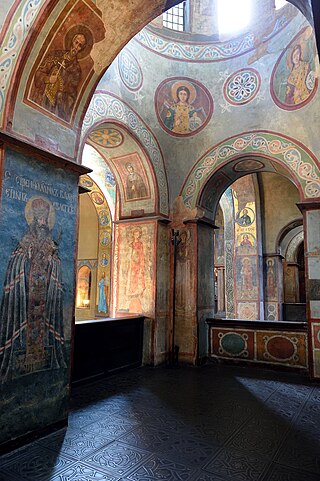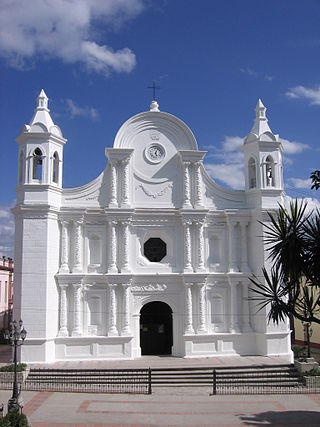Overview of Christianity in Turkmenistan
Christians, most of whom are ethnic Russians, constitute less than 11% of the population in Turkmenistan; Eastern Orthodoxy in Turkmenistan is the main form of Christianity. [1]
| Christianity by country |
|---|
 |
| |
Christians, most of whom are ethnic Russians, constitute less than 11% of the population in Turkmenistan; Eastern Orthodoxy in Turkmenistan is the main form of Christianity. [1]
The Russian Orthodox Church is officially recognized and constitute the largest religious minority. [2] [1] The Church is under the jurisdiction of the Russian Orthodox Archbishop in Tashkent, Uzbekistan. [3]
In 2020, around 300 Catholics lived in Turkmenistan. [4] [5]
In 2007 other denominations included German Lutherans, as well as the Evangelical Christian Baptist Church of Turkmenistan, Seventh-day Adventist Church of Turkmenistan, Full Gospel Christian Church of Turkmenistan (Pentecostals), Light of the East Church (Dashoguz Pentecostal Church), Greater Grace Church of Turkmenistan, International Church of Christ, and the New Apostolic Church of Turkmenistan who were all registered at that time. [3] There was also a small number of Evangelical Christians in Turkmenistan. [6]

All religious groups have to register, and unregistered activity is illegal. [1]
In 2023, the country scored zero out of 4 for religious freedom. [7] It was noted that restrictions have tightened since 2016, the same year Turkmenistan was ranked the 26th worst place in the world to be a Christian. [8]
In particular, people who were not Sunni or Russian Orthodox reported some harassment, and Muslims who had converted to Christianity face social pressure. [1]
Freedom of religion in Colombia is enforced by the State and well tolerated in the Colombian culture. The Republic of Colombia has an area of 439,735 square miles and its population is estimated at 46 million.

Moldova's constitution provides for freedom of religion and complete separation of church and state, though the constitution cites the "exceptional importance" of Eastern Orthodox Christianity. Discrimination on the basis of religious affiliation is illegal, and incitement to religious and ethnic hatred was made illegal in May 2022. Religion in Moldova is dominated by the Eastern Orthodox branch of Christianity. According to the 2014 Moldovan census, 90 per cent of the country reported to be of the Eastern Orthodox Christian faith. Of this number, around eighty to 90 per cent of Orthodox Moldovans belong to the Moldovan Orthodox Church which is subordinate to the Russian Orthodox Church, and has played a powerful role in deepening Russia's influence in Moldova. The remaining 10–20 per cent of Orthodox Moldovans belong to the Metropolis of Bessarabia, which is subordinate to the Romanian Orthodox Church.

Christianity is the largest religion in Seychelles, with Roman Catholicism being its largest denomination.

Christianity in Kazakhstan is the second most practiced religion after Islam and one of the major religions of Kazakhstan.

Christianity is the predominant religion in Ukraine, with 85% of the population identifying as Christian according to a 2022 survey conducted by the Kyiv International Institute of Sociology (KIIS). Seventy-two percent of the population avowed fidelity to an Eastern Orthodox Church: 54% of Ukrainians proclaimed adherence to the autocephalous Orthodox Church of Ukraine; 14% identified as Orthodox Christian without specifying a church affiliation; 4% associated with the Moscow Patriarchate. Another 9% of Ukrainians professed devotion to the Catholic Church in Ukraine: 8% Ukrainian Greek Catholics and 1% Latin Catholics. Two percent of the population declared affiliation to a mainstream Protestant Church, and a further 2% identified with some alternative sect of Christianity.

The National Administrative Department of Statistics (DANE) does not collect religious statistics, and accurate reports are difficult to obtain. However, based on various studies and a survey, about 90% of the population adheres to Christianity, the majority of which (70.9%) are Roman Catholic, while a significant minority (16.7%) adhere to Protestantism and other Christian groups.

Christianity is a minority religion in Yemen. The Yemeni constitution mentions religious liberty. There are three churches in Aden.

Christianity is a minority religion in Tajikistan.

The Christian community in Qatar is a diverse mix of European, North and South American, Asian, Middle Eastern and African expatriates. In 2023, they form around 15.4% of the total population. Many of them are from the Philippines, Europe, and India. Most Christians in Qatar are not Arab Christians.

Religion in Greece is dominated by Christianity, in particular the Greek Orthodox Church, which is within the larger communion of the Eastern Orthodox Church. It represented 90% of the total population in 2015 and is constitutionally recognized as the "prevailing religion" of Greece. Religions with smaller numbers of followers include Islam, Roman Catholicism, Greek Catholicism, Judaism, Evangelicalism, Hellenic paganism, and Jehovah's Witnesses. Also a small number of Greek atheists exist, not self-identifying as religious. Religion is key part of identity for most Greeks, with 76% of Greeks in a 2015–2017 survey saying that their nationality is defined by Christianity. According to other sources, 81.4% of Greeks identify as Orthodox Christians and 14.7% are atheists.
Protestants composed less than 1% of the population of Tajikistan in 2020. There is a Lutheran congregation in Dushanbe. There are about 3,000 evangelicals, who mainly are of Russian origin. The Constitution provides for religious freedom. There are Methodist and Seventh-day Adventist congregations in Tajikistan. Many Christians are from South Asia. According to the European Baptist Federation, government officials view the nation's Christians in the same light as militant Muslims.
Qatar has a population of approximately 3 million people. About 13.7% are Christian. This includes a large number of migrant workers who follow Catholic, Orthodox or Protestant beliefs. In 2000, the number of Protestants was estimated at 1% of the population and the Anglicans (being classified otherwise there) at 1.4% for the same year.

Christianity in Uzbekistan is a minority religion.
According to various polls, the majority of Kazakhstan's citizens, primarily ethnic Kazakhs, identify as Sunni Muslims. In 2020, Shia Muslims made up 0.55% of the population.
The Turkmen of Turkmenistan, are predominantly Muslims. According the U.S. Department of State's International Religious Freedom Report for 2022,
According to U.S. government estimates, the country is 89 percent Muslim, 9 percent Eastern Orthodox, and 2 percent other. There are small communities of Jehovah's Witnesses, Shia Muslims, Baha’is, Roman Catholics, the International Society for Krishna Consciousness, and evangelical Christians, including Baptists and Pentecostals. Most ethnic Russians and Armenians identify as Orthodox Christian and generally are members of the Russian Orthodox Church or Armenian Apostolic Church. Some ethnic Russians and Armenians are also members of smaller Protestant groups. There are small pockets of Shia Muslims, consisting largely of ethnic Iranians, Azeris, and Kurds, some located in Ashgabat, with others along the border with Iran and in the western city of Turkmenbashy.

Christianity is the most widely professed religion in Tanzania, but in the island of Zanzibar most of the population is Muslim.

Estonia, historically a Lutheran Christian nation, is today one of the least religious countries in the world in terms of declared attitudes, with only 14 percent of the population declaring religion to be an important part of their daily life. This is thought to largely be a result of the Soviet occupation of Estonia in 1940, prior to which Estonia had a large Christian majority.

The main religion traditionally practiced in Latvia is Christianity. As of 2019, it is the largest religion (68.84%), though only about 7% of the population attends religious services regularly.

The predominant religion in Honduras is Christianity, with Catholicism and Evangelicalism being its main denominations. The country is secular and the freedom of religion is enshrined in the nation's constitution.
A 2020 Pew Forum survey estimates that approximately 63% of the population of Tanzania identifies as Christian, 34% as Muslim, and 5% practitioners of other religions. Most Christians are Catholics and Lutherans, although there are also Anglicans, Pentecostals and other groups.